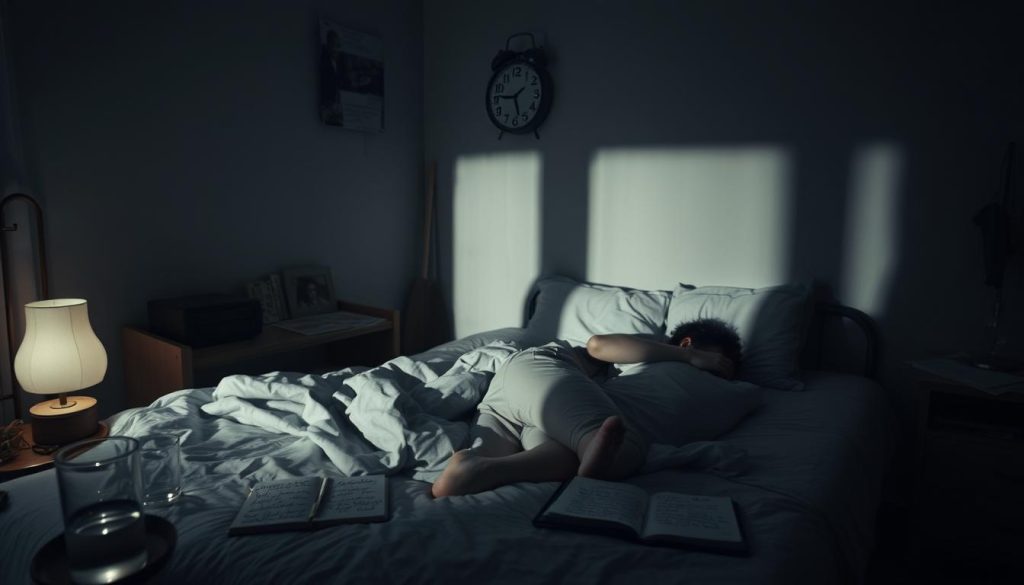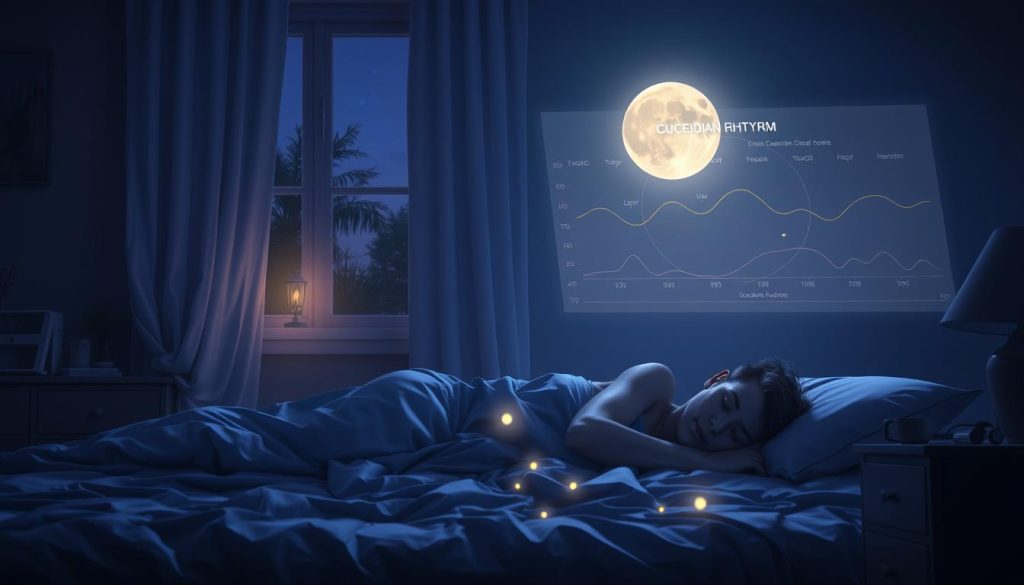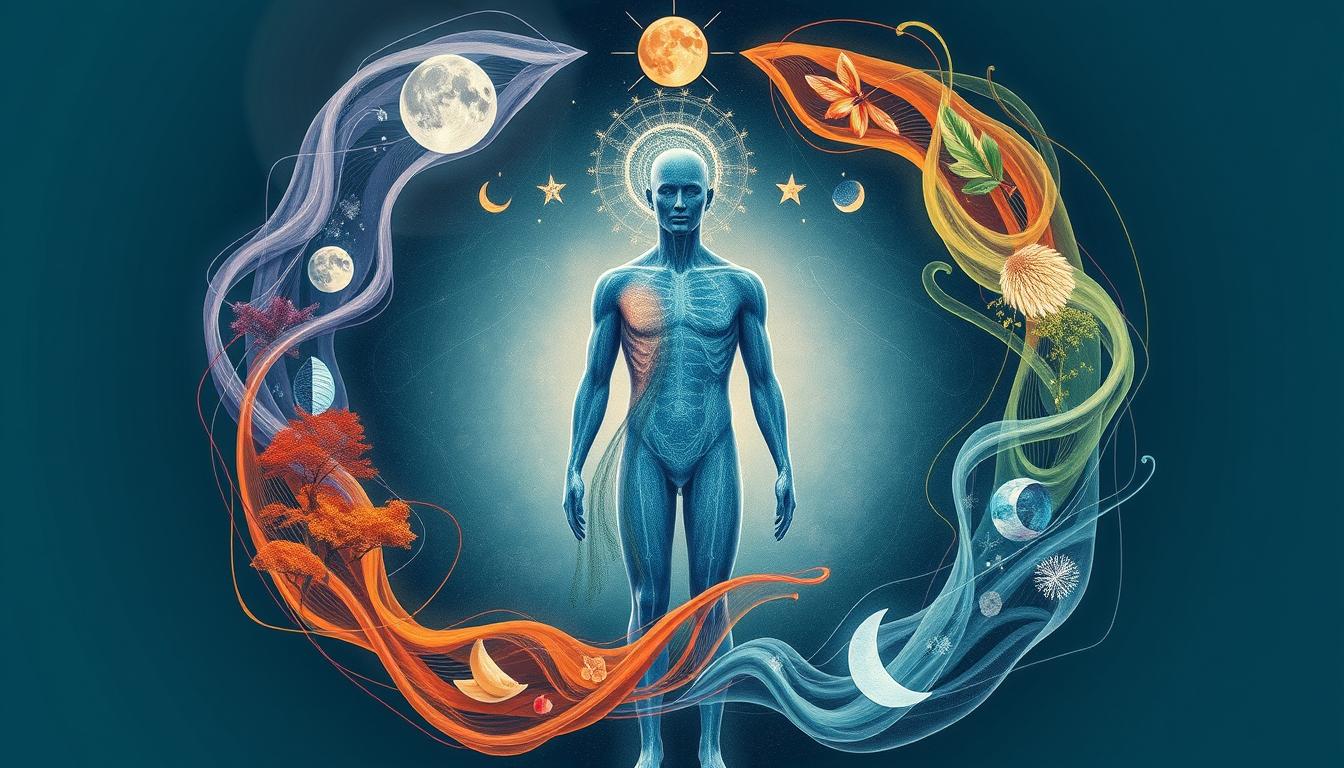Exploring the link between circadian rhythm and sleep disorders, I see how crucial they are for a good night’s sleep. Studies reveal that our internal clocks greatly affect when we sleep and wake. By grasping our sleep patterns, we can improve our sleep quality.
This knowledge helps us and others to feel better overall. Let’s dive into these important connections and find ways to improve our sleep health.
The Importance of Circadian Rhythm
A well-functioning circadian rhythm is key for quality sleep and overall health. It helps our bodies sync with the outside world. Knowing how it works helps improve sleep and daily habits.
Understanding Biological Clocks
Biological clocks control when we’re awake or asleep. They’re mainly influenced by light and sleep patterns. Keeping these clocks in sync is crucial for our health.
The Role of Light in Regulating Sleep
Light plays a big role in our biological clocks and sleep. Natural sunlight helps keep our rhythm in check. But, blue light from screens at night can mess with it, causing sleep problems. Knowing how light affects our sleep helps us make better choices.

Common Sleep Disorders Related to Circadian Rhythm
Learning about sleep disorders linked to circadian rhythms is key to understanding their impact on my health. Insomnia and Delayed Sleep Phase Syndrome (DSPS) are two common issues I face. Knowing the signs of insomnia helps me know when to get help. Understanding DSPS lets me see how it disrupts my sleep schedule.
Identifying Symptoms of Insomnia
Insomnia symptoms can really affect my daily life. The main signs include:
- Difficulty falling asleep at night.
- Struggling to stay asleep throughout the night.
- Waking up too early and being unable to return to sleep.
These problems can make me feel tired, cranky, and unfocused during the day. They show how sleep disorders can affect us deeply.
Delayed Sleep Phase Syndrome: What You Need to Know
Delayed sleep phase syndrome makes it hard for me to fall asleep at a normal time. This condition often leads to:
- Sleeping much later than I want to.
- Struggling to wake up in the morning.
- A hard time keeping up with a regular work or school schedule.
Knowing about DSPS helps me find ways to manage its challenges. It can improve my sleep quality.

How Circadian Rhythm Affects My Sleep Quality
I’ve learned how important a regular circadian rhythm is for sleep. Sometimes, late-night screen time messed with my sleep. This made me feel tired and affected my daily life.
Personal Experiences with Disrupted Sleep Patterns
Disrupted sleep patterns have been a big issue for me. Watching TV late and irregular bedtimes made sleep hard. The blue light from screens made it even harder to fall asleep.
After a few nights of bad sleep, I felt my mind wasn’t as sharp. I got irritable easily. It was clear my body needed a regular sleep schedule.
The Impact on Daily Life and Energy Levels
Bad sleep patterns affected me more than just at night. My energy levels went up and down, making it hard to focus. Simple tasks felt too hard.
I felt physically tired and my mind wasn’t clear. This made it hard to break the cycle of poor sleep.
| Factors Affecting Sleep Quality | Effects on Daily Life |
|---|---|
| Irregular Sleep Schedule | Decreased productivity |
| Late-Night Screen Time | Cognitive decline |
| Inconsistent Sleep Patterns | Fluctuating energy levels |
| Poor Sleep Quality | Increased fatigue and irritability |

Strategies to Improve Circadian Rhythm and Sleep Disorders
Improving my circadian rhythm and sleep disorders has greatly boosted my well-being. I’ve found that a structured sleep routine and natural light benefits are key. These strategies help regulate my sleep and make me more energized and productive.
Establishing a Sleep Routine
A consistent sleep routine is essential for a healthy circadian rhythm. By sticking to a regular bedtime and wake-up time, I tell my body when to relax or wake up. Here are some tips for a good sleep routine:
- Go to bed and wake up at the same times every day, even on weekends.
- Create a calming bedtime ritual, such as reading or listening to gentle music.
- Avoid stimulating activities and screens within an hour of bedtime.
- Limit caffeine and alcohol intake, particularly in the hours leading up to sleep.
The Benefits of Exposure to Natural Light
Natural light is crucial for our internal clocks. I make sure to get outside in the morning. This allows sunlight to energize me for the day. Here are some benefits I’ve seen:
- Improved mood and increased alertness throughout the day.
- Enhanced ability to fall asleep at night due to better circadian alignment.
- Boosted vitamin D levels, which can positively affect overall health.
By focusing on a solid sleep routine and natural light, I’ve improved my circadian rhythm and sleep quality. These simple steps have made a big difference in my health and well-being.
Circadian Rhythm and Sleep Disorders: Finding Balance
My journey to balance my circadian rhythm and manage sleep disorders has shown me the power of small changes. Being mindful of my evening habits and regular exercise has made a big difference. I also choose foods that help me sleep better, like those rich in magnesium, and cut down on caffeine as the day ends.
Creating a sleep-friendly environment is key. I stick to a bedtime routine and keep my bedroom quiet and cool. Studies show that a dark, quiet, and cool room helps you sleep deeper. This is important for fighting off the effects of disrupted sleep cycles.
Dealing with sleep disorders can be tough, but making these changes has improved my sleep quality. It also makes daily life easier. I’m committed to managing my sleep disorders through these simple steps. My goal is to improve my overall health and get better sleep in the future.

